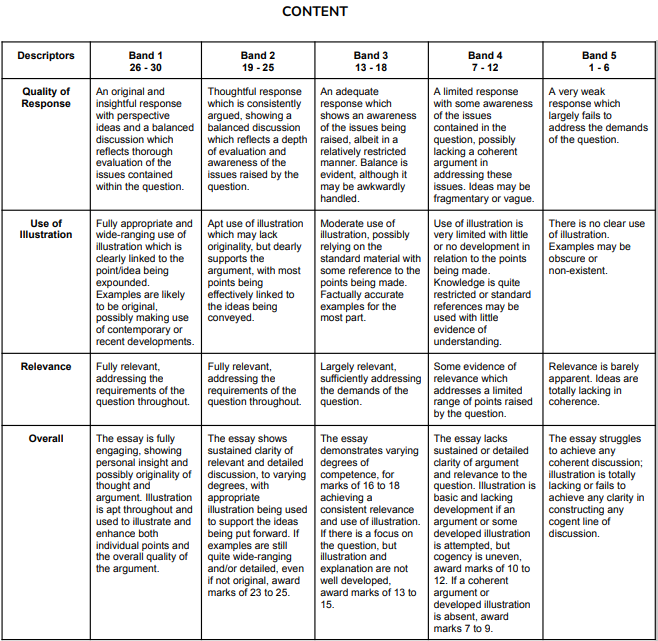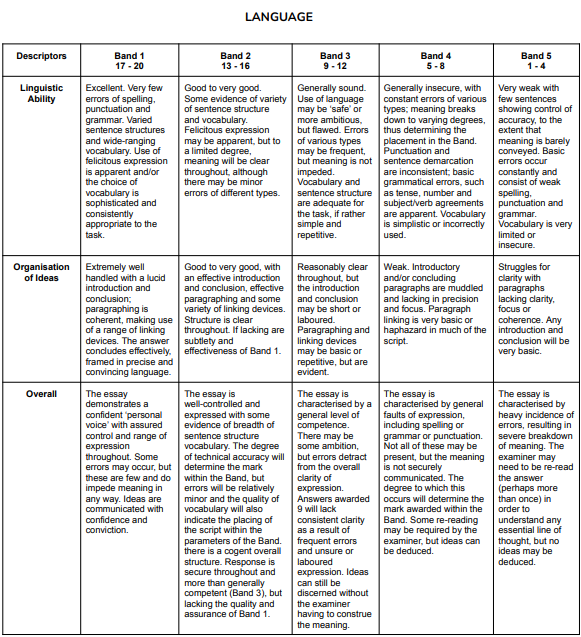"As a GP tutor for over a decade, I've seen students transform their struggles with general knowledge and objective analysis into strengths, mastering one of the most challenging A Level subjects with intelligence and critical thinking."

As a GP tutor for over a decade, I have seen students struggle with and successfully overcome challenges ranging from a lack of general knowledge to an inability to carry out objective analysis. General Paper, usually referred to as GP, is arguably one of the most challenging subjects in the A Levels. It requires not only a strong understanding of current affairs and global issues but also the ability to think intelligently and critically.
Over the years, I have compiled a list of strategies and sound advice on how to excel at Essay Writing. Read on for some common complaints and tips on how to overcome them. Alternatively, if you would like to learn directly from us, drop us a WhatsApp at 8892 2948.
Complaint #1: “You can’t study for GP”

Au contraire, one can very much study for general paper. Strategise early and you may even obtain that coveted A grade. Start off by looking at the topics. Which ones are you most interested in, and can already discuss with some confidence?
| – Societal Issues – Politics and Governance – The Media – The Arts – The Sciences – Technology – Sports – Universal Human Issues | – Global Conflicts – Crime and Punishment – Education – Culture and Tradition – The Environment – Animal Rights – Philosophical Issues – Ethics and Morality |
I would suggest that you pick up to six topics to focus on, and then read and immerse yourself in articles, books and even social media posts that discuss them. Six topics may sound daunting to some of you, so try just two to start with, and then eventually expand to a few more if you find yourself capable of it. Some students have gotten away with focusing on just two or three topics. Ultimately it depends on your capability and capacity to digest the subject matter. Expert Tip: Focusing on ‘Societal Issues’ especially with regards to Singapore will allow you to simultaneously study for Application Question (AQ) too.
Complaint #2: “But I don’t have any general knowledge”

Then it is time to start reading. There are two ways in which you can plump up your general knowledge, and this very much depends on whether you are already an avid reader. Don’t like reading? Fear not. There is still, and always a way.
Strategy 1: Try reading The Economist, The New York Times, and Time to start with. Along the way you may look up the internet for other readings associated with your topic of choice. When you do, make sure that you are reading well-written pieces with thoughtful perspectives. Check in with your teachers if you are not sure whether you are reading quality writing. To read good magazines for free, install the PressReader app on your device and then log in with your NLB account.
Strategy 2: Instead of depending on your decidedly tired brain to store up knowledge or let’s face it, some not so interesting readings, make a simple list on an online document with the link to the reading, your understanding of the article, and some statistics or conclusions that were presented. This document will be very useful when you are revising for GP, and do not have time to hunt through hundreds of articles to glean the information you need.
General knowledge is what it is, it is general, and without some attempt to read extensively, it will be fairly difficult to argue with clarity and conviction.
Complaint #3: “I can never pass Paper 1, my essay is never good enough”

Say it together with me: “I can and I WILL pass Paper 1”. Work on a solid structure, stick to it and repeat. Practice is key, and if you can get a teacher to read through your essays or essay plans to give you feedback, it will bolster your confidence and skills. Try Curio’s Independent Programme which involves marking and feedback only without the weekly commitment – and expense – of tuition.
- Suggested Structure
| Introduction OV1 = Opposing View & Rebuttal OV2 = Opposing View & Rebuttal SV1 = Supporting View SV1 = Supporting View SV1 = Supporting View Conclusion |
- Tips for Content
| 1. Pay attention to qualifiers in the question which can make or break your essay. Examples of qualifiers are ‘today’, referring to current happenings, or ‘increasingly’ which prompts you to make a comparison between two states. |
| 2. Answer the question at the start of a body paragraph. Answer the question at the end of a body paragraph. Check again. Have you answered the question? |
| 3. Think big and broad – use PESTLE to help you along. Political | Economic | Social | Technological | Legal | Environmental OR International | National | Individual |
- Tips for Language
| 1. Good grammar is essential. If you are still confusing subject-verb agreements and getting lots of ‘expression’ errors in red, stay away from complex sentences until you feel more confident. Write shorter sentences which you are sure of first, and build up your writing skills. Nothing irks an examiner more than having to wade through your arguments which are put together with poor grammar. |
| 2. Use a GREAT hook and then go back to it if possible in your conclusion. It gives the impression of a neat little bow all tied up and ready to be presented. Check out this post: The GP Essay: How to Craft an Excellent Introduction. |
| 3. Introduce opposing viewpoints with the following phrases: – While some may claim that… – Critics of the view that…often argue that… – Opponents to…have pointed out that… – Naysayers of the view that….typically claim… – An opposing argument frequently cited is that… – It might seem persuasive to argue that… – Some would dispute this on the grounds that… |
| 4. Go further. Introduce opposing viewpoints with specific names of groups that hold certain beliefs. For example: – Environmental Activists – Feminists – LGBTQAI + proponents – Millennials/Boomers/Gen-Zers – Liberals – Conservatives may claim that…/may argue that…/often adopt the position that… |
| 5. Phrase your rebuttals thus: – However, I believe that it is more important to consider…because… – I heartily disagree with this view because… – This view however fails to consider that… – Despite their arguments, I still hold the position that… |
- Avoid Fallacies
Here are some common fallacies to avoid. Read your sentences twice and then read them again. Check with a teacher if you are not sure that you have committed a fallacy. You must avoid these, no matter what!
– Hasty Generalisation
Hasty generalisation is a logical fallacy where a conclusion is drawn about a whole population based on a small or unrepresentative sample. This type of reasoning leads to stereotypes and incorrect assumptions because it extrapolates limited evidence to make broad claims. It is one of the most common fallacies that GP students end up writing.
Examples of Hasty Generalization:
- Personal Experience:
- Example: “I met two aggressive dogs from that breed, so all dogs of that breed must be aggressive.”
- Explanation: This conclusion is based on encounters with only two dogs and does not account for the behaviour of all dogs of that breed.
- Limited Observation:
- Example: “My friends who study computer science are introverts, so all computer science students must be introverts.”
- Explanation: The statement is based on a small group of friends and does not represent all computer science students.
- Single Incident:
- Example: “I tried sushi once and didn’t like it, so all Japanese food must be bad.”
- Explanation: The conclusion about all Japanese food is drawn from a single experience with one dish.
- Quick Judgments:
- Example: “A man cut me off in traffic today; men are terrible drivers.”
- Explanation: This generalisation is made from one incident and unfairly labels all men as bad drivers.
- Small Sample Size:
- Example: “I know two people who got sick after eating at that restaurant, so the food there must always be unsafe.”
- Explanation: The conclusion is drawn from the experiences of only two people, which is not enough to assess the restaurant’s overall food safety.
- Unrepresentative Group:
- Example: “I read an article about a teenager who hacked into a government system, so teenagers must be skilled hackers.”
- Explanation: The article describes a specific individual, and it is unreasonable to extend this skill level to all teenagers.
- Observational Bias:
- Example: “I have seen several sports cars being driven recklessly, so sports car owners must all drive recklessly.”
- Explanation: This conclusion is based on observed behavior of a few drivers and does not consider the driving habits of all sports car owners.
Hasty generalisations are problematic because they lead to misconceptions and biases, often without considering the complexity and diversity of the subject or population being generalised.
– Strawman
The strawman fallacy occurs when someone misrepresents or oversimplifies another person’s argument in order to make it easier to attack or refute. Instead of addressing the actual argument, they create a distorted or exaggerated version of it, attack that version, and then claim to have disproven the original argument.
Examples of the Strawman Fallacy:
- Simplification:
- Original Argument: “We should invest more in public transportation to reduce traffic congestion and pollution.”
- Strawman Argument: “My opponent wants to spend billions on new buses and trains that nobody will use. This is a waste of money.”
- Explanation: The original argument is about improving public transportation to address specific issues, but it is misrepresented as a wasteful expenditure.
- Exaggeration:
- Original Argument: “I believe we need stricter regulations on pollution to protect the environment.”
- Strawman Argument: “He thinks we should shut down all factories and put everyone out of work to save a few trees.”
- Explanation: The argument for stricter regulations is exaggerated to an extreme position that implies shutting down all industrial activity.
- Distortion:
- Original Argument: “We need to reform the education system to ensure all children have access to quality education.”
- Strawman Argument: “She wants to throw out the entire current education system and start from scratch, which is impractical and disruptive.”
- Explanation: The call for reform is distorted into a call for completely abandoning the existing system.
- Oversimplification:
- Original Argument: “We should consider implementing universal healthcare to ensure everyone has access to medical services.”
- Strawman Argument: “My opponent thinks the government should control every aspect of our lives, including our healthcare choices.”
- Explanation: The argument for universal healthcare is oversimplified into a claim about government control over personal lives.
- Misrepresentation:
- Original Argument: “Animal testing should be limited because it is often inhumane and there are alternative methods.”
- Strawman Argument: “You think we should completely ban all animal testing, even if it means delaying medical breakthroughs.”
- Explanation: The argument for limiting animal testing is misrepresented as a call for a total ban, ignoring the nuance about alternative methods.
How to Avoid the Strawman Fallacy:
- Accurate Representation: Restate the argument accurately before presenting a counter-argument.
- Address the Core Issue: Focus on the main points of the argument rather than picking on minor details or exaggerating aspects of it.
By avoiding the strawman fallacy, discussions can remain focused on the actual issues and promote more productive and honest debate.
– Ad Hominem
The ad hominem fallacy occurs when someone attacks the character, motive, or other attribute of the person making an argument rather than addressing the substance of the argument itself. This type of fallacy aims to discredit the argument by discrediting the individual, which is irrelevant to the argument’s validity.
Examples of the Ad Hominem Fallacy:
- Personal Attack:
- Original Argument: “We should implement stricter environmental regulations to combat climate change.”
- Ad Hominem Attack: “You’re not a scientist, so your opinion on environmental regulations doesn’t matter.”
- Explanation: The attack is on the person’s credentials rather than the merits of their argument.
- Attacking Motives:
- Original Argument: “Raising the minimum wage will help reduce poverty.”
- Ad Hominem Attack: “You only support raising the minimum wage because you want to win votes in the upcoming election.”
- Explanation: The focus is on the alleged motive rather than addressing whether raising the minimum wage will reduce poverty.
- Character Attack:
- Original Argument: “We need to improve public transportation to reduce urban congestion.”
- Ad Hominem Attack: “You’ve always been lazy and have never used public transportation yourself, so why should we listen to you?”
- Explanation: The argument is dismissed by attacking the person’s character and habits rather than the argument itself.
- Association Fallacy:
- Original Argument: “Vaccines are effective in preventing diseases.”
- Ad Hominem Attack: “You support vaccines because you are paid by pharmaceutical companies.”
- Explanation: The argument is undermined by suggesting the person is biassed due to financial connections, rather than discussing the effectiveness of vaccines.
- Past Actions or Beliefs:
- Original Argument: “Tax reform is necessary to ensure a fairer economic system.”
- Ad Hominem Attack: “You can’t be trusted on tax policy because you were convicted of tax evasion 20 years ago.”
- Explanation: The attack is based on past actions rather than addressing the current argument for tax reform.
How to Avoid the Ad Hominem Fallacy:
- Focus on Arguments, Not People: Address the argument’s content and evidence rather than the person presenting it.
- Separate Character from Argument: Understand that a person’s character or past actions do not inherently invalidate their argument.
- Seek Evidence: Base counter-arguments on facts and evidence that directly relate to the argument being made.
By avoiding ad hominem attacks, discussions can remain respectful and focused on the actual issues, allowing for more meaningful and constructive debate.
– Slippery Slope
The slippery slope fallacy is a logical fallacy that occurs when someone argues that a relatively small first step will inevitably lead to a chain of related events culminating in some significant (usually negative) effect, without providing sufficient evidence that this chain of events will actually happen. This fallacy often relies on fear or speculation rather than logic and evidence.
Examples of the Slippery Slope Fallacy:
- School Policies:
- Argument: “If we allow students to redo their assignments, soon they’ll expect to redo every assignment, and eventually, they won’t bother to study or try hard at all.”
- Explanation: The argument assumes that allowing redos will lead to a complete lack of effort from students, without evidence that such a progression is inevitable.
- Technology Use:
- Argument: “If we let children play video games for an hour a day, soon they’ll be playing all the time, neglecting their studies, and ultimately failing in school.”
- Explanation: The argument jumps from an hour of video games to complete academic failure without evidence that this progression will necessarily occur.
- Political Policies:
- Argument: “If we start offering free healthcare, the next thing you know, we’ll be a full-blown socialist state with no economic freedom.”
- Explanation: The argument assumes that introducing free healthcare will inevitably lead to a complete transformation into a socialist state, without providing evidence for such a chain of events.
How to Avoid the Slippery Slope Fallacy:
- Demand Evidence: Use concrete evidence that shows how one step will necessarily lead to the extreme outcome being predicted.
- Analyse Each Step Independently: Evaluate each step in the supposed chain of events on its own merits, rather than assuming they will all happen automatically.
- Use Proportionality: Consider whether the initial action is proportionate to the predicted outcome and if there are realistic intermediary steps that could be controlled.
By avoiding the slippery slope fallacy, arguments can remain more logical, focused, and grounded in evidence, leading to more rational and productive discussions.
Other common fallacies students may unwittingly commit include Red Herring, Appeal to Authority, Bandwagon Appeal, Emotional Appeal and Circular Argument. Check them out thoroughly and keep them in mind when you are writing. Chances are if you write an argument which leaves you in great doubt as to its validity, some sort of fallacy may have been committed. Check with a teacher whenever possible.
- Pay Attention to the Rubrics
The rubrics aren’t for teachers and examiners to mark your essays. They are for YOU to peruse and mull over. Read them carefully and set some goals for yourself. Which bands are realistic for you to reach right now? Which bands do you want to aim for next?


- Last Words: Hang in there
If you have been failing GP almost consistently or just getting poor grades, it can be very daunting thinking about how to improve, let alone get an A. The GP essay is very different from the one you did for ‘O’ levels and much more demanding, but once you get the structure right and thoroughly understand the topic that you will be expounding upon, it will begin to get easier. If you need help, check out some affordable classes here: Curio A Level GP Classes or if you don’t have the time for classes and just need someone to mark your essays, try the Curio Independent Programme. Drop us a WhatsApp at 8892 2948 if you would like more information. Good luck!

Leave a Reply